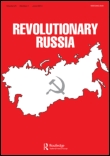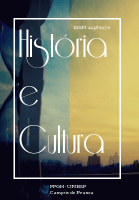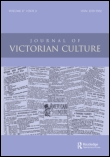
Quaestio Rossica
Scope & Guideline
Advancing Interdisciplinary Dialogue in the Humanities
Introduction
Aims and Scopes
- Russian Diasporas and Communities:
The journal extensively covers the dynamics and historical context of various Russian diasporas, including their cultural, social, and political interactions within different geographical settings. - Interdisciplinary Historical Analysis:
'Quaestio Rossica' emphasizes a multifaceted approach to history, integrating perspectives from sociology, anthropology, and cultural studies to enhance the understanding of Russian history and its global implications. - Cultural Heritage and Memory Studies:
The exploration of cultural heritage, memory, and identity within the context of Russian history is a core focus, examining how past narratives shape contemporary cultural phenomena. - Language and Translation Studies:
The journal addresses issues related to the Russian language, translation practices, and the impact of linguistic policies on cultural exchange and identity. - Political and Diplomatic History:
A significant aspect of the journal's scope involves the examination of Russia's political history, including diplomatic relations and the influence of historical events on modern politics.
Trending and Emerging
- Digital Humanities and Community Studies:
There is an increasing focus on the impact of digitalization on diaspora communities, exploring how virtual spaces shape identity and cultural practices among Russian-speaking populations. - Postcolonial Perspectives:
Emerging themes in postcolonial studies are gaining traction, with research examining the legacies of imperialism and colonialism in Russia's historical narrative and its implications for modern identity. - Memory and Trauma Studies:
Research on collective memory, trauma, and historical narratives is becoming more prominent, particularly in relation to the memories of war, migration, and the cultural heritage of diasporas. - Environmental and Ecological History:
An emerging interest in the ecological impacts of historical events and policies is being reflected in recent publications, indicating a growing recognition of environmental factors in understanding Russian history. - Cultural and Artistic Activism:
There is a notable trend towards exploring cultural and artistic responses to social and political issues, reflecting a broader engagement with contemporary societal challenges within the Russian-speaking world.
Declining or Waning
- Traditional Russian Literature Studies:
The focus on classical Russian literature appears to be diminishing, as the journal increasingly emphasizes contemporary cultural studies and interdisciplinary approaches, reflecting a shift towards modern narratives and their implications. - Soviet Era Analysis:
Research specifically centered on the Soviet era is less frequent, indicating a potential waning interest in this period in favor of broader historical contexts that include post-Soviet developments and contemporary issues. - Nationalism and Ethnic Conflict:
Themes surrounding nationalism and ethnic conflict within Russian history seem to be less emphasized, possibly due to a growing focus on transnational perspectives and the complexities of diaspora experiences.
Similar Journals

Revolutionary Russia
Diving Deep into Revolutionary Narratives.Revolutionary Russia, published by Routledge Journals, Taylor & Francis Ltd, stands as a pivotal scholarly resource for those immersed in the study of Russian history and revolutionary movements. Established in 1988, this journal delves into the multifaceted aspects of Russia's revolutionary past and its impact on contemporary society, making it an essential publication for historians, political scientists, and cultural analysts alike. With an ISSN of 0954-6545 and E-ISSN 1743-7873, it is currently indexed in Scopus, ranking at #809 out of 1760 in the Arts and Humanities category, reflecting its significance in the field. Although it is classified in the Q4 quartile for history, its commitment to high-quality research offers valuable insights that contribute to ongoing scholarly discussions. Researchers and students will find Revolutionary Russia an invaluable platform for publishing their findings and engaging with groundbreaking analyses of revolutionary themes.

RUSSKAIA LITERATURA
Unveiling the Rich Tapestry of Russian Literary TheoryRUSSKAIA LITERATURA, published by the esteemed Russian Academy of Sciences and the State Academy of Humanities (GAUGN), is a prominent journal dedicated to the exploration and analysis of Russian literature and literary theory. Since its inception in 2013, the journal has established itself within the academic community as a valuable resource for scholars and students alike, aiming to elevate discourse and critical thought in the field. Although currently categorized in Q4 of Literature and Literary Theory by Scopus, it plays a significant role in fostering a deeper understanding of Russian literary heritage. The journal's commitment to rigor and quality is underscored by its inclusion in internationally recognized databases, making it a relevant venue for contemporary literary scholarship. Researchers and practitioners in the field will find RUSSKAIA LITERATURA an indispensable tool to access vital knowledge and contribute to discussions that resonate within and beyond the Russian context.

HERALD OF THE RUSSIAN ACADEMY OF SCIENCES
Empowering Researchers with Interdisciplinary PerspectivesHERALD OF THE RUSSIAN ACADEMY OF SCIENCES is a prominent interdisciplinary journal published by MAIK NAUKA/INTERPERIODICA/SPRINGER, specializing in the fields of cultural studies and political science. With an ISSN of 1019-3316 and an E-ISSN of 1555-6492, this journal features a robust platform for disseminating high-quality research that informs contemporary debates in social sciences. Over its converged years from 2005 to 2024, it has established itself as an influential source of scholarly articles, achieving a Q2 ranking in Cultural Studies and a Q3 ranking in Political Science and International Relations for 2023. The journal is recognized for its valuable contributions, with Scopus ranks reflecting a strong presence in both cultural studies (Rank #444/1304, 65th percentile) and political science (Rank #450/706, 36th percentile). Researchers, professionals, and students seeking to advance their understanding of the societal dynamics at play are encouraged to explore the insightful perspectives offered by this esteemed publication.

Vestnik Sankt-Peterburgskogo Universiteta-Istoriya
Bridging Histories: A Platform for Scholarly DiscourseVestnik Sankt-Peterburgskogo Universiteta-Istoriya is a distinguished academic journal published by the St Petersburg University Press, specializing in the field of History. As an influential platform since its inception in 2017, the journal has rapidly gained recognition, achieving a commendable Q2 ranking in History for 2023 and ranking #631 out of 1760 in Scopus's category of Arts and Humanities. With an emphasis on fostering scholarly discourse and disseminating high-quality research, it presents a curated selection of original research articles, critical reviews, and historical analyses, appealing to historians, researchers, and students alike. Operating from Russia, Vestnik Sankt-Peterburgskogo Universiteta-Istoriya serves not only as an incubator for innovative ideas but also as a bridge for international collaboration in the historiographical community. Although it currently does not offer open access, the journal's commitment to academic rigor and relevance ensures its continued impact in the field, with converged years extending to 2024, providing a rich archive for future scholars to engage with.

Historia e Cultura
Fostering Scholarly Exchange in the HumanitiesHistoria e Cultura is a distinguished open-access journal focusing on the dynamic and multifaceted exploration of history and culture within the context of the Humanities. Published by the UNIV ESTADUAL PAULISTA JULIO MESQUITA FILHO, FAC CIENCIAS HUMANAS & SOCIAIS, the journal serves as a vital resource for researchers, professionals, and students engaged in the fields of historical research and cultural studies. Since transitioning to open access in 2012, Historia e Cultura aims to democratize knowledge by providing free, unrestricted access to high-quality articles that foster scholarly exchange and innovation. Although the specific impact factor remains undisclosed, the journal is dedicated to contributing to the academic discourse through rigorous peer-reviewed research. Situated in Brazil, Historia e Cultura is well-positioned to address both local and global issues, encouraging critical engagement with cultural heritage and identity. Researchers and scholars are invited to submit their work, ensuring that diverse perspectives are represented in the study of our shared history.

Journal of Victorian Culture
Exploring the Rich Tapestry of Victorian CultureThe Journal of Victorian Culture, published by Oxford University Press, is an esteemed academic journal that explores the multifaceted cultural landscape of the Victorian era. With a publication history spanning from 1996 to 2024, this journal serves as a critical platform for scholars and practitioners in the fields of Cultural Studies, History, Literature and Literary Theory, and Visual Arts and Performing Arts. It currently holds notable rankings, including Q3 in Cultural Studies and History, and Q2 in Literature, making it a prominent resource in these disciplines. Targeted at an audience that includes dedicated researchers, professionals, and students, the journal promotes interdisciplinary exploration and innovation, encouraging contributors to engage deeply with Victorian themes and their influence on contemporary culture. For those interested in cutting-edge discussions and insights, the Journal of Victorian Culture provides access to rich, scholarly content that is indispensable for understanding the era's impact on modern artistic and social paradigms.

Novoe Literaturnoe Obozrenie
Illuminating Contemporary Literary LandscapesNovoe Literaturnoe Obozrenie, an esteemed publication dedicated to the realms of Cultural Studies and Literature and Literary Theory, serves as a vital resource for scholars and professionals alike. Published by NOVOE LITERATURNOE OBOZRENIE-NEW LITERARY OBSERVER in the Russian Federation, this journal provides critical insights and scholarly critiques that reflect the evolving landscape of literary discourse. With an established H-index and a focus on fostering academic inquiry, the journal has secured its place amidst contemporary scholarly discussions, indexed in Scopus with rankings that illustrate its commitment to quality despite a current presence in the lower quartiles. Novoe Literaturnoe Obozrenie is a non-open-access journal, encouraging a traditional yet scholarly approach to literary studies and remains an essential read for researchers, students, and professionals that seek to deepen their understanding of literature’s impact on culture and society. Publishing from 2016 until 2024, it continues to bridge theoretical frameworks with practical discourse, making significant contributions to the fields it encompasses.

Experiment-A Journal of Russian Culture
Fostering Dialogue on Russia's Cultural IdentityExperiment-A Journal of Russian Culture is a distinctive publication dedicated to exploring the multifaceted dimensions of Russian culture, encompassing literature, art, and social history. Published by BRILL, a respected name in academic publishing, this journal provides a platform for original research and insightful discourse, fostering a deeper understanding of Russia's rich cultural heritage. With an ISSN of 1084-4945 and an E-ISSN of 2211-730X, the journal is organized in a quarterly format, although it has seen varied publication years from 1996 through 2023. While it currently holds a Q4 ranking in both Cultural Studies and Visual Arts and Performing Arts, its commitment to interdisciplinary inquiry makes it a vital resource for researchers, professionals, and students interested in contemporary and historical Russian cultural phenomena. Despite its modest impact factors, the journal remains an essential platform for the dissemination of critical perspectives and theoretical frameworks, contributing to the ongoing dialogue about Russian identity and its artistic representations. The journal is available in print and may have limited digital access options, making it all the more precious for collectors and libraries committed to cultural studies.

Novyi Filologicheskii Vestnik-New Philological Bulletin
Advancing Knowledge in Linguistics and Literary StudiesNovyi Filologicheskii Vestnik-New Philological Bulletin is a distinguished academic journal published by the Russian State University for the Humanities, devoted to the interdisciplinary study of linguistics, literature, and philology. With its ISSN 2072-9316, this journal serves as an essential platform for scholars, researchers, and students aiming to explore the depths of philological research and its applications. Although currently operating under a traditional access model, the journal emphasizes accessibility and engagement with advancements in linguistic theory and literary analysis, reflecting the evolving landscape of philological studies. The bulletin is dedicated to fostering academic discourse by publishing original research, critical essays, and comprehensive reviews, thereby contributing significantly to the advancement of knowledge and understanding in the field. Set in the heart of Moscow, the journal aims to bridge local and global scholarship, inviting contributions that showcase innovative methodologies and theoretical frameworks. Overall, Novyi Filologicheskii Vestnik-New Philological Bulletin stands as a vital resource for anyone interested in contemporary developments in philology and related disciplines.

Rossiiskaya Istoriya
Illuminating Russia's Past and PresentRossiiskaya Istoriya is a distinguished academic journal published by ROSSIISKAYA AKAD NAUK, IZDATELSTVO NAUKA, focusing on the rich tapestry of Russian history, sociology, and political science. With an ISSN of 0869-5687, this journal serves to illuminate critical historical narratives and contemporary societal issues within the Russian context. While it currently does not offer open access options, its insights are pivotal for researchers, professionals, and students keen on exploring the dynamics of Russian society and its historical developments. The journal has been recognized in the Q3 and Q4 quartiles for History and Sociology, respectively, in 2023, highlighting its contribution to academic discourse. Although the journal's coverage in Scopus has been discontinued, its ranking demonstrates a significant presence in the Arts and Humanities (Rank #1056) and Social Sciences categories (Rank #1267). The editorial team strives to present high-quality scholarly articles that not only reflect upon the past but also engage with pressing contemporary issues, making it an essential resource for anyone looking to deepen their understanding of the intricate interplay between history and social sciences in Russia.